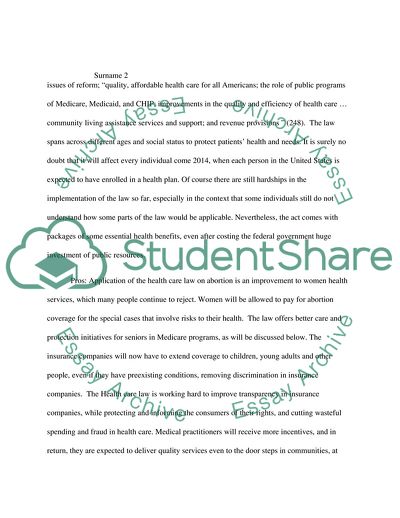Cite this document
(Obama Health Care Law Essay Example | Topics and Well Written Essays - 2250 words, n.d.)
Obama Health Care Law Essay Example | Topics and Well Written Essays - 2250 words. https://studentshare.org/health-sciences-medicine/1793920-what-is-the-obama-health-care-law-what-are-the-pros-and-cons-what-is-the-impact-of-small-businesses-corporations-sole-proprietor-senior-citizens-and-your-average-college-student-age-18-25-does-it-apply-to-all-businesses
Obama Health Care Law Essay Example | Topics and Well Written Essays - 2250 words. https://studentshare.org/health-sciences-medicine/1793920-what-is-the-obama-health-care-law-what-are-the-pros-and-cons-what-is-the-impact-of-small-businesses-corporations-sole-proprietor-senior-citizens-and-your-average-college-student-age-18-25-does-it-apply-to-all-businesses
(Obama Health Care Law Essay Example | Topics and Well Written Essays - 2250 Words)
Obama Health Care Law Essay Example | Topics and Well Written Essays - 2250 Words. https://studentshare.org/health-sciences-medicine/1793920-what-is-the-obama-health-care-law-what-are-the-pros-and-cons-what-is-the-impact-of-small-businesses-corporations-sole-proprietor-senior-citizens-and-your-average-college-student-age-18-25-does-it-apply-to-all-businesses.
Obama Health Care Law Essay Example | Topics and Well Written Essays - 2250 Words. https://studentshare.org/health-sciences-medicine/1793920-what-is-the-obama-health-care-law-what-are-the-pros-and-cons-what-is-the-impact-of-small-businesses-corporations-sole-proprietor-senior-citizens-and-your-average-college-student-age-18-25-does-it-apply-to-all-businesses.
“Obama Health Care Law Essay Example | Topics and Well Written Essays - 2250 Words”. https://studentshare.org/health-sciences-medicine/1793920-what-is-the-obama-health-care-law-what-are-the-pros-and-cons-what-is-the-impact-of-small-businesses-corporations-sole-proprietor-senior-citizens-and-your-average-college-student-age-18-25-does-it-apply-to-all-businesses.


